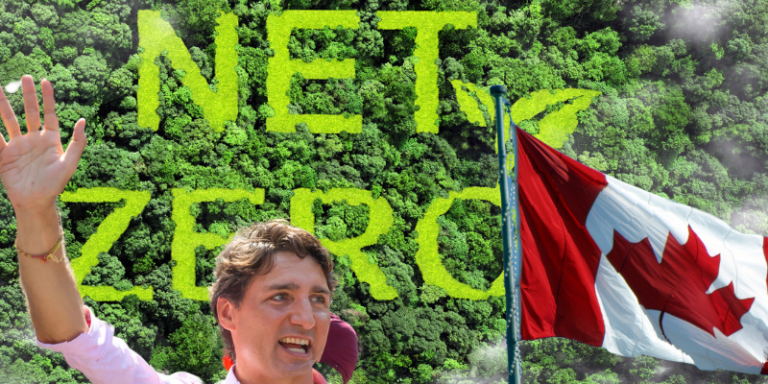
From the Heartland Institute
Author: H. Sterling Burnett

Energy and Climate Overview: Canadian Edition Outlines why Trudeau's climate plan will cause economic hardship in Canada and will not take any measurable steps to improve the global climate.
TORONTO (November 13, 2024) – Sensitive Climate Policy Canada and the Heartland Institute have published a new book called Energy and Climate Overview: Canadian Edition. The 88-page book is a timely rebuttal of Canada's push for “net-zero emissions,” outlining how the goal is unachievable before 2050, is scientifically unnecessary and will result in lower living standards for all Canadians. There are no obvious benefits to the environment.
The book is authored by Ron Davison, engineer, president of the Canadian Friends of Science, and H. Sterling Burnett, director of the Arthur C. Robinson Center for Climate and Environmental Policy in the American Heartland. Written by Dr. H. Sterling Burnett Institute, a free market think tank based in Illinois. This book is designed to provide an easy-to-use reference for journalists, teachers, students, and the public interested in the facts on climate and energy policy. Contributing authors include Tom Harris, Robert Lyman, Paul MacRae, and John Zacharias.
Energy and Climate Overview: Canadian Edition covers the following topics and controversies:
- Barriers to Canada’s journey to net-zero emissions
- Carbon capture plans are technologically impractical and costly
- Problems with intermittent “renewable” energy sources such as wind and solar, including damage to land and wildlife
- In fact, electric cars are not “zero-emission” cars and exploit workers in the world’s poorest countries
- Canadians’ energy and economic sacrifices will have consequences for global CO2 emissions and global temperatures
- Dramatic reductions in the use of fossil fuels in developed countries will leave an estimated 3 billion residents in poor countries hungry due to a lack of nitrogen fertilizers
- What are the real major drivers of global climate change?
- In fact, data doesn’t support claims that wildfires, heat waves, droughts and tropical cyclones are getting worse
- In fact, the ocean is not “acidifying” or rising to dangerous levels
- Benefits of using fossil fuels for humanity around the world
You can view a copy of the book (not available for public distribution) at this link. You can view graphs, charts and reference materials via hyperlinks at this link. Hard copies of the book are available from Society of Friends of Science.
The following statements from the authors and editors of the book Energy and Climate Overview: Canadian Edition may be used for attribution. If you would like more information or to schedule an interview, please see the contact information below or contact Heartland Institute Vice President and Director of Communications Jim Lakely at media@heartland.org.
“I hope that Energy & Climate Overview: Canadian Edition will parallel the goals of Canada’s Smart Climate Policy and the Heartland Institute to engage in some open, civil and much-needed dialogue about the real-world issues related to energy and climate. Achieving Net Zero The unnecessary, unachievable ideological drivers of emissions and their associated energy transition. The book does focus on Canada, but the fundamentals discussed can be applied globally. To slow the rate of temperature rise by an immeasurable amount while continuing to cost taxpayers debt financing we need to start paying attention to the financial and energy security problems we already face and stop exacerbating them.
Ron Davidson, P.Eng.
President
Society of Friends of Science
Lead author, Energy and Climate Overview: Canadian Edition
“This book is a fact-based rebuttal of false claims that climate change poses an existential threat, that limiting the development and use of fossil fuels in Canada will minimize the future harm of climate change, and that Canada's current climate policies will protect the country and Its country benefits.
“The key takeaway from this timely, fact-based book is that the Trudeau government's climate policies are painful for Canadians' wallets, lifestyles and freedoms, but do the environment no good.”
Dr. H. Sterling Burnett
director
Arthur Robinson Center for Climate and Environmental Policy
heartland institute
“Many leading companies in Canada’s financial sector, at least publicly, fully support the government’s quest to achieve net-zero carbon emissions by 2050. However, in doing so, they ignore the economic impact that net-zero emissions will have on their customers’ savings and investments. Losses – The damage is documented in detail in this book. Asset managers and others in the financial community are custodians of the nation’s savings and investable wealth, and a basic cost-benefit analysis of net zero will quickly show that, if they live up to their fiduciary obligations, Climate and environmental “benefits” fall far short of justifying estimated costs in the trillions of dollars and negating net zero policies. Therefore, when providing investment advice to clients, it may be prudent to move away from net zero emissions in 2050.
John Zechariah
director
Canadians support smart climate policies
Heartland Institute is a national nonprofit organization founded in 1984 and headquartered in Arlington Heights, Illinois. Its mission is to discover, develop and promote free market solutions to social and economic problems. Heartland is a leading think tank recognized globally for promoting skepticism about catastrophic human-caused climate change. For more information, please visit our website.

H. Sterling Burnett
Dr. H. Sterling Burnett is director of the Arthur B. Robinson Center for Climate and Environmental Policy and editor-in-chief of Environment and Climate News.
Relevant
